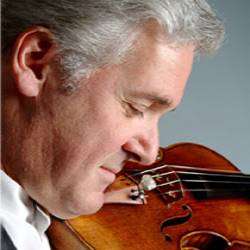|
Back
Bruch, Bruckner...Bruchnest? New York
Avery Fisher Hall, Lincoln Center
01/09/2013 - & January 10, 11, 12, 2013
Max Bruch: Violin Concerto Nr. 1 in G minor, Opus 26
Anton Bruckner: Symphony Nr. 6 in A Major (Nowak edition)
Pinchas Zukerman (Violin)
New York Philharmonic Orchestra, Christoph Eschenbach (Conductor)

P. Zukerman (© Paul Labelle)
The New York Philharmonic has been eschewing their usual adventurous spirit these past few weeks, plunking to program a pair of over-popular concertos (albeit played by two master artists). But while Jean-Yves Thibaudet did indeed plunk his way through the Grieg Concerto last week displaying a cavalier lack of interest, Pinchas Zukerman flew the Max Bruch Violin Concerto into stratospheric heights. I have never seen Mr. Zukerman even close to disappointing, as conductor or violinist or violist, and last night was a great example.
True, it’s virtually inconceivable to hear the Bruch First Concerto like a virgin, touched for the very first time. But with effort–and with Messrs Zukerman and Eschenbach at the helm–one realizes that this is still an undisputable masterpiece.
The piece is frequently sentimentally cheapened, but this was not Mr. Zukerman’s way. As a whole, he showed a composer of sweep and fire. In particular, he started with that great expanse, soaring up from the darkest tones to the most delicate shimmering high notes, so one was actually ready to shout “Bravo” before it was done.
Yet he and the conductor had the same conception of the Bruch, which was rather rare. One realized last night what Joseph Joachim meant when he said he preferred the Bruch to the concertos of Beethoven, Mendelssohn and Brahms. For just as the Bruch form was unorthodox, so Mr. Zukerman never passed it on as mere show piece. We know the violinist’s own virtuosity, so all he had to do was play with an understated sense of drama, leading the music to have an uncommon significance.

C. Eschenbach (© DR Central Picture)
Nobody doubted the significance of Bruckner’s Sixth Symphony, but not every conductor can give it both expression and impetuosity When necessary, Mr. Eschenbach allowed the explosive bursts to explode. But mainly, this was laid out like an mammoth tapestry, with ornaments only adding to the conception.
Like Pinchas Zukerman allowing the notes to do their duty, Christoph Eschenbach paced the opening movement with such sensibility that the crescendos and those splendid mirrored horn and trumpet duets to resonate from the orchestra. The Adagio was intense, of course, but it lacked that forced intensity which can make listeners uncomfortable.
In the Scherzo, conductor Eschenbach make the most of what is appreciated least in Bruckner. His sense of song. Not operatic or Austrian song, but an orchestral melody. Maybe it was the Wagnerian influence, but Bruckner never quite ended the song, and Mr. Eschenbach left it dangling for a second, so that other lyrics came through before returning to the original.
Unbelievably, some people noisily walked out during the Sixth Symphony. (Too much noise? The horns too unnerving?), but nobody would dare walk out of the finale, which Mr. Eschenbach conducted with splendor, drama and unerring volition to the last majestic notes.
Harry Rolnick
|